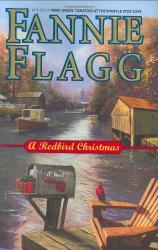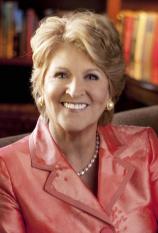Interview: December 17, 2004
December 17, 2004
Bookreporter.com reviewer Bronwyn Miller interviewed Fannie Flag, author of numerous New York Times bestsellers including FRIED GREEN TOMATOES AT THE WHISTLE STOP CAFE and STANDING IN THE RAINBOW. Flagg talks about her choice of setting for her latest novel, A REDBIRD CHRISTMAS, and the development of her characters, many of whom are strong, irrepressible women. She also explains how being dyslexic and having A.D.D. impacts her writing routine and why she thinks Southerners have such a flair for storytelling.
Bookreporter.com: What made you decide to write a holiday-themed novel?
Fannie Flagg: My publisher asked me if I would write a Christmas story, and it occurred to me that I did in fact have a story that I wanted to write. One that would be perfect for a Christmas story.
BRC: For A REDBIRD CHRISTMAS you return to your native Alabama. What made you choose this setting?
FF: I returned to Alabama for this book because it is my home. The place I write about really does exist and the people who live there really are as nice as I portray them in the book. This book is also about the healing power of nature, something I found out first-hand. I think being close to nature, water, birds, etc. and watching the seasons change can also change a person’s outlook on life. It has a tremendous effect on me. Nature calms me down and helps put my life in perspective.
BRC: You have a knack for creating wonderful, supportive little communities like Lost River and you write often of the restorative powers of small towns. Did you grow up in a town like this, or is it more an idealized version of what home should be? Is this why you still spend a great deal of time in Alabama?
FF: I did not grow up in a small town; I grew up in Birmingham, Alabama. However, the suburb where we lived had a small downtown with its own drugstore, movie house and grocery store, and so it seemed to me that it was a small town in Alabama and I love it. And yes, it is so nice to have a place where people are supportive and stick together through thick and thin.
BRC: So many of your characters are strong, irrepressible women. Do they represent people you know or aspects of your own personality?
FF: I write about strong, irrepressible women I suppose because both my grandmother and mother, and most of the women I know, are strong. Mostly because they had to be due to circumstances. However, I think women are naturally strong no matter what. When there is a death in the family or an illness, notice that the men usually fall apart and the women are the ones who deal with it, or at least that has certainly been my experience.
BRC: Frances Cleverdon, the "matriarch" to all the inhabitants of Lost River, is quite reminiscent of Neighbor Dorothy from STANDING IN THE RAINBOW and WELCOME TO THE WORLD, BABY GIRL. What attracts you to writing strong matriarch characters? Is Frances based on anyone you know?
FF: To me there is nothing more comforting than a motherly, loving older woman. My grandmother was very special to me and I suppose I write these characters in her memory. As a matter of fact, there is a real Frances Cleverdon, a wonderful woman I have known since I was in the sixth grade who has been like a member of my own family. She also has a sister named Mildred who is a delightful character as well.
BRC: The descriptions of the towns in which your novels take place are vivid and picturesque, and A REDBIRD CHRISTMAS is no exception. How important is setting to you? Do you first envision a place before you write the plot?
FF: The setting of a novel is as important to me, if not more so, than any of the characters in the book. It is the main character and I always envision the place first. In this novel the real community of “Lost River” (not its actual name) is a place where I lived and the real Frances Cleverdon lives there along with many Redbirds!
BRC: In A REDBIRD CHRISTMAS, the town pulls together for one another, whether it's Frances Cleverdon helping Oswald fit in or the entire town rallying to help Patsy with her numerous operations. It's refreshing to see these neighborly values, especially when the headlines and evening news focus primarily on terrorism and attacks. Do you find that it's more difficult to have a positive outlook during times like these?
FF: I find it is even more important in these times to have a positive outlook on our lives. I think, if anything, we need to focus on how precious our freedom and our country is and how much we have to be thankful for.
BRC: A REDBIRD CHRISTMAS has already been optioned for film and will be directed by Jon Avnet, the director of FRIED GREEN TOMATOES. Will you also be adapting this one for the screen? Which is more rewarding --- writing novels or screenplays?
FF: I am thrilled that Jon Avnet is doing A REDBIRD CHRISTMAS as a film. I will be co-writing the script with him. Writing a book and writing a screenplay are two different things, and both are very hard. In the end, if people like them, both are very rewarding.
BRC: How does your dyslexia affect your writing routine? Approximately how long does it take you to complete a book, from start to finish?
FF: Being dyslexic and having A.D.D. I am easily distracted and so I must be locked in a room with no phone, fax machine, dog, cat, human, etc. in order to write. I don’t spell well, but thank heavens I have a copy editor who corrects my spelling and grammar. The time in which it takes me to write a book varies. Sometimes it is four or five years, sometimes it is less. It all depends on how much research I need to do and how much time I can devote to the book.
BRC: When you write, do you have a clear outline with a beginning, middle and an end, or do you start with an idea and see where it takes you?
FF: I do not start with an outline. I usually have some vague idea of the beginning and the end when I start a book, but I have no idea what will come in the middle or how I will get to the end. I am always surprised at what happens in between.
BRC: Like many other writers of your region, you are a natural born storyteller. Why do you think Southerners have such a flair for storytelling?
FF: I think Southerners love to talk, and writing is just a natural extension of that. I like books that are positive and make me feel better. I don’t want to read about the dark side of life; I can look at the news for that.
BRC: Your debut novel, DAISY FAY AND THE MIRACLE MAN, grew out of a short story and a visit to a writers' conference. With Eudora Welty's encouragement, you developed it into a novel. What advice would you offer to aspiring writers?
FF: I would say to aspiring writers: Write what you know. Figure out what your message to the world is --- what your passion is --- and follow your heart, not your head.
BRC: Do you have any favorite holiday books?
FF: I love A CHRISTMAS MEMORY by Truman Capote.
BRC: Do you have a special holiday tradition that you can share with us?
FF: I always gain about five pounds. That seems to be the most consistent tradition I have.
BRC: What are you working on now, and when can readers expect to see it?
FF: I am not working on anything right now. After Christmas I am starting on the screenplay of A REDBIRD CHRISTMAS.




